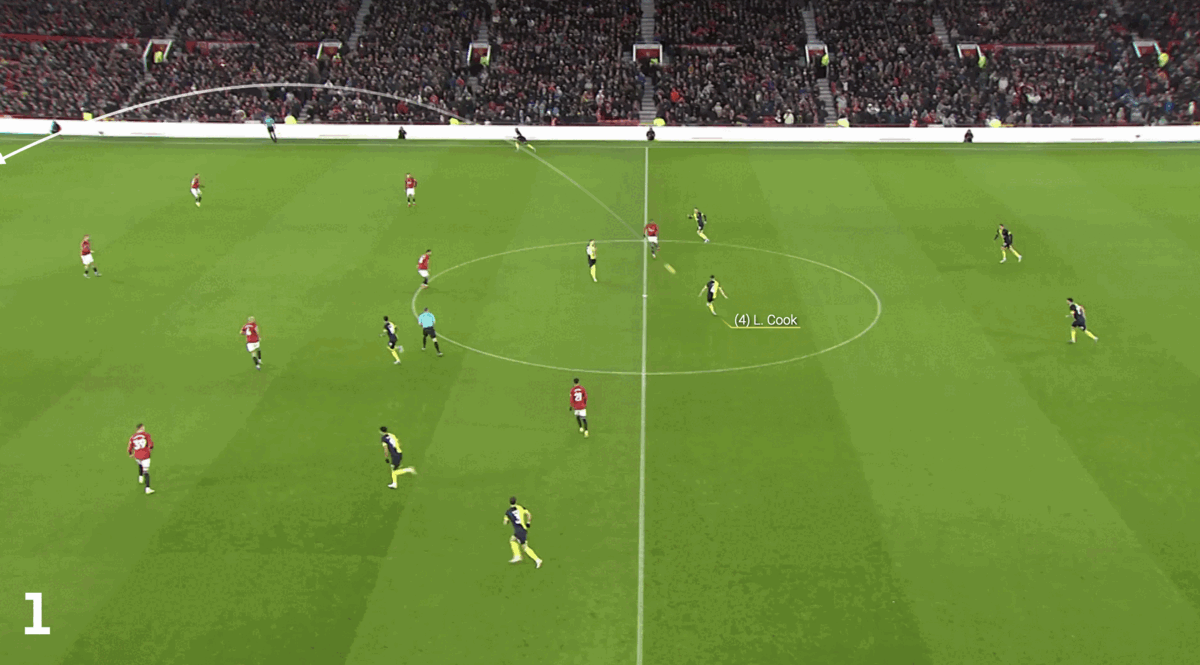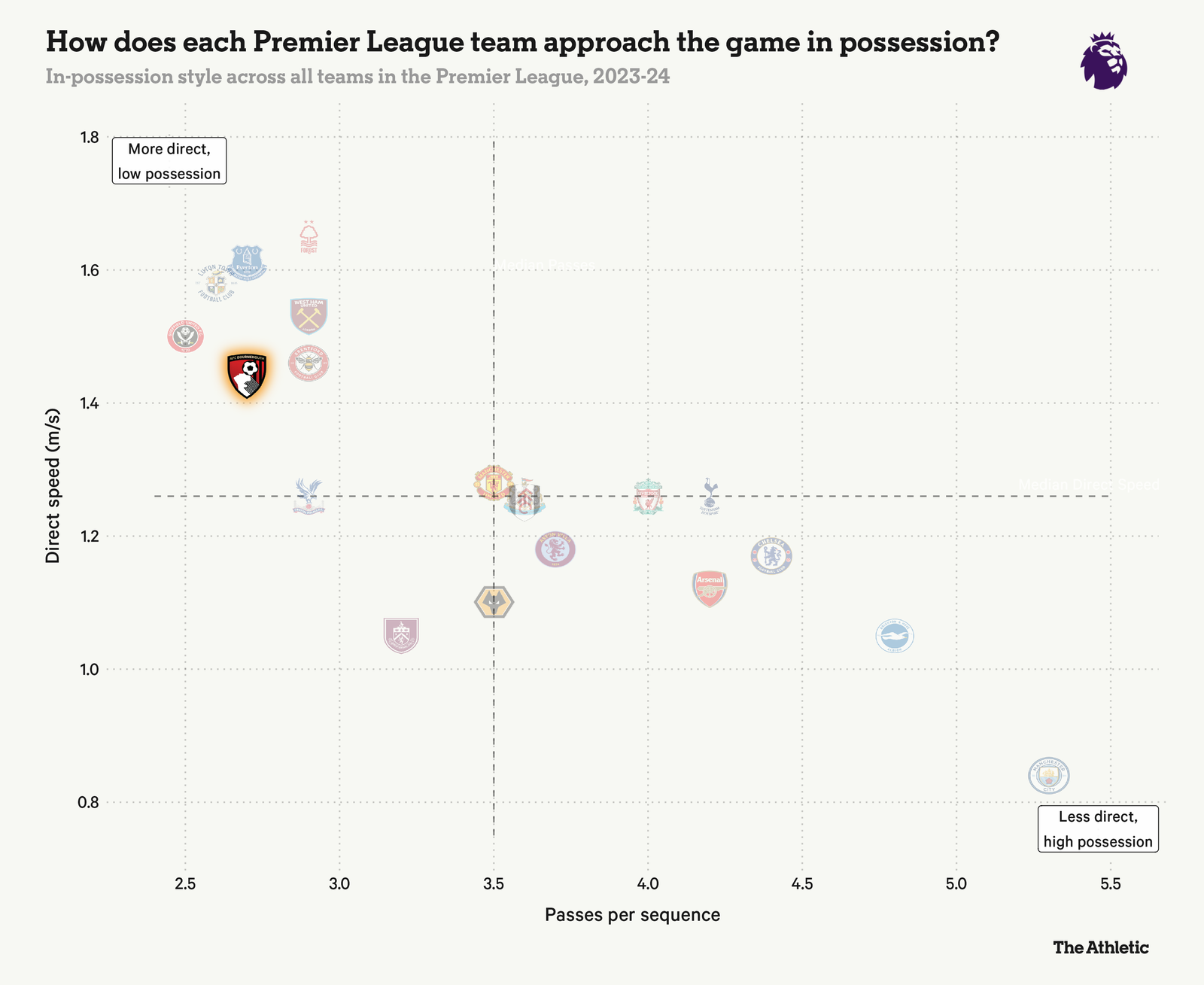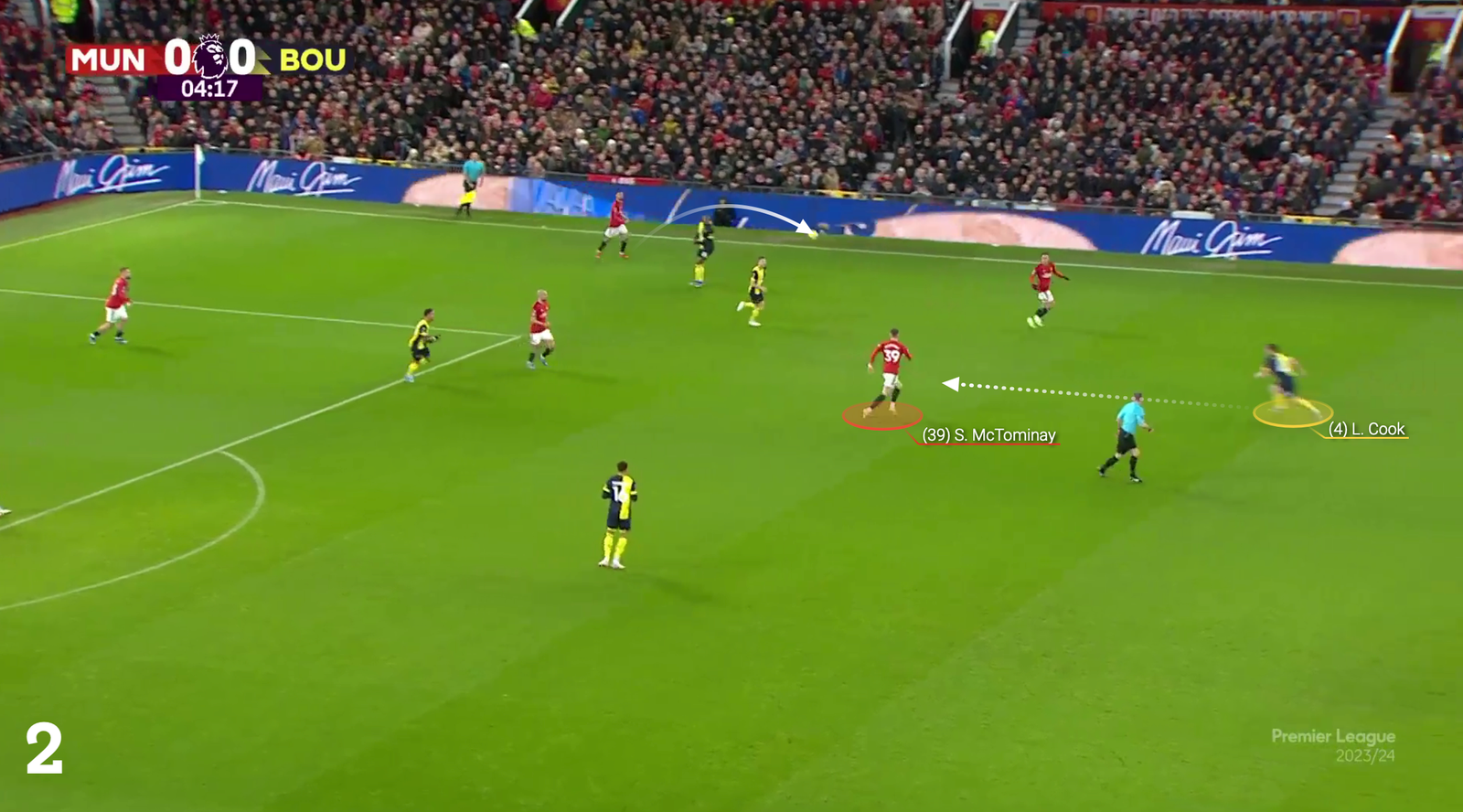“Nice to see some friendly faces!” chuckled Gary O’Neil, to a front row of forced smiles.
The press room at the Vitality Stadium was subdued once again, a smattering of local media sucking up another Bournemouth defeat, but this one stung that little bit more. Their former coach was sat in front of them — the one who was ruthlessly dismissed in the summer to make way for a new project at the club — and had taken all three points.
As if a reckless red card for Lewis Cook, a goalkeeping mistake by Neto and a last-minute sucker-punch were not frustrating enough for Andoni Iraola, the 2-1 loss to Wolverhampton Wanderers in October made it four consecutive defeats in the Premier League, extending his winless run in the competition to nine. Both managers downplayed the significance of O’Neil’s return, but it was a subplot that turned up the heat.
“Nobody should be concerned about me,” said Iraola. “They should be concerned about Bournemouth winning games.”
All the while, those within the club remained calm.
Before a seemingly do-or-die clash with Burnley the following week, sporting director Richard Hughes — now at Liverpool — travelled to Spain to communicate to Iraola’s entourage that Bournemouth would stick with him, irrespective of the result. He had spent 18 months compiling information on Iraola, and not even a historically bad start to the season was going to alter his convictions.
Hughes had reasons to be patient, agreeing with Iraola’s sentiment that the football was not as bad as the results suggested. The defeat to Wolves showed a more cohesive high press than in recent weeks and some anomalous mistakes — a slip from Ilya Zabarnyi away to Everton, Milos Kerkez’s own goal against Brighton & Hove Albion, a late defensive lapse away to Brentford, with Kerkez again guilty — set the tone for an unfortunate sequence of early-season results.
There were off-the-field setbacks, too. Iraola’s assistant Inigo Perez — now manager of their former side Rayo Vallecano — was denied a work permit and could not join his coaching staff. With only one member of staff from Spain at Bournemouth (from the fitness department), he needed time to build a relationship with existing coaches Tommy Elphick and Shaun Cooper, former players at Bournemouth.
Hughes recognised that the summer had been rocky, with injuries to recruits Tyler Adams and Alex Scott, along with the departure of Jefferson Lerma and a failed deal for box-to-box midfielder Gaetano Castrovilli, leaving Iraola light in midfield.
With ambitions to transform the playing style, shared by the sporting director, the manager was given more time. Seven months, 46 points, and a shiny new contract (until 2026) later, and no one is looking back.
For one employee close to the first team at Bournemouth, speaking anonymously to protect relationships, Iraola’s temperament and clarity of thought helped the 41-year-old weather the storm.
“There was never once any panic,” he tells The Athletic. “He has been so consistent with his methods and messaging, his mood and relationships, through the good, bad and different.
“He’s got a real humility but underneath it, there’s a belief in what he’s doing.”
It is an assessment that tallies with anecdotes of Iraola’s early career. At Bournemouth, he came to the staff Christmas party and spent over an hour happily talking to non-footballing members of the team, asking them about their roles and taking pictures, while his transparency in mic’d up training sessions and honest assessments at press conferences have left a lasting impression on fans and journalists.
🚨 MIC’D UP IS HERE 🚨
Watch Andoni Iraola up close for a fascinating insight into training under our new head coach.
You won’t want to miss this 🧐
— AFC Bournemouth 🍒 (@afcbournemouth) July 15, 2023
Speaking to The Athletic, Bournemouth owner Bill Foley described Iraola as a “family man and a terrific motivator”, while back in Spain, former Rayo goalkeeper Alberto Garcia observed Iraola’s impact.
“He sees things very clearly, and has a lot of personality when making decisions,” he said. “He sends messages of tranquillity, and leaves out nothing, all the players know what he wants.”
Iraola brought Madrid club Rayo up to La Liga through the play-offs, and Garcia half-joked that the players felt more comfortable in the two-legged ties than they had throughout the season, such was the preparation the coach put into the biggest games. The season earlier, he had overseen a cup run in charge of second-tier Mirandes, beating Villarreal and Sevilla on the way to the semi-finals, while he would go on to beat Barcelona three times in five games with Rayo.
“He is a coach who prepares each game very well and makes you understand exactly what you will face on Sunday,” says Garcia.
It is why Philip Billing barely hesitated when he struck from 40 yards against Burnley — Iraola had spoken to the midfielder throughout the week to look out for James Trafford’s advanced positioning after a quick turnover.
It is why Cook blasted the ball out for a goal kick after three seconds against Manchester United at Old Trafford — so the team could push forward, exploit the lack of confidence in United’s build-up, and force an early turnover that almost led to a penalty for a challenge on Dominic Solanke (frame four, below).

As confidence in the system grew, the smaller details of Iraola’s innovations began to shine through.
Such was the transformation to the style at Bournemouth, who have gone from being one of the division’s most passive teams without the ball to one of its most aggressive, that the boardroom anticipated teething problems. For many players, Billing’s inspired strike in that Burnley win catalysed belief that Iraola’s approach could catch out opponents.
Bournemouth have scored nine goals after recovering the ball in the attacking third and only Liverpool have launched more Opta-defined counter-attacks. Looking to the below scatter graph, detailing the speed in which Premier League teams move the ball up the pitch, Iraola’s men can be seen among a cluster of the more direct sides.
Unlike most other modern coaches, the intricacies of Iraola’s system come with his team out of possession, less interested in his team’s build-up as long as he is disrupting the opponent’s rhyhtm.

Bournemouth got better when — in Solanke’s words, speaking to The Times of London in December — pressing patterns became “second nature” and “embedded” in the players’ heads. The timing of the jumps forward was more synchronised and instinctive, as their attacking players began to anticipate opposition movements and steal the ball.
In their win against Manchester United, note how Cook tears from midfield while the ball is still in the air to intercept in the build-up to the opening goal.
Iraola’s midfielders must be positionally intelligent and mobile, understanding when to commit to the press.

In that respect, Ryan Christie has been transformative, brought into a deeper role from his right-sided position. Those within the club cite the 2-0 home win over Newcastle United in November as a turning point, and not just because of the result.
With Billing unable to play, Christie was trialled behind Justin Kluivert, where he has remained. No player has made more ball recoveries than his 225 in this season’s Premier League but fellow midfielder Cook is just two behind.
Solanke has made more tackles, recoveries and clearances than any other striker, and Marcos Senesi has attempted more tackles than any other centre-back.
Along with the consistent methodology and detailed defensive plans, there is an appetite throughout this squad to battle for the ball, driven by a relentless midfield duo, and a manager whose message — now backed up by success — is being received.
Training plays an important part, with Iraola seeking to keep players engaged with competitive, small-sided games.
“Even when it’s tactical he makes it a competition; it’s always constraints-based with rules and lots of thinking and that brings an intensity,” a source close to the first team said.
“I don’t think the players understood what he was going for at first, but it’s a different way of training, and you can see the ones in the group flourishing from it and the ones who really want to win.”
Iraola’s track record meant wholesale transformation was inevitable, but few could have foreseen the extremes to which his debut season in English football has swung.
At Rayo, former winger Isi Palazon summed it up nicely.
“We know that if we want to win, we need to receive the ball in dangerous positions because, in the long run, more good things will happen from these situations than bad.”
Iraola has settled at Bournemouth, but the football never truly will as the game of risk and reward continues. The only fear may be how long Bournemouth can keep one of the hottest properties in management — however many contracts he signs.
(Top photo: Robin Jones – AFC Bournemouth/AFC Bournemouth via Getty Images)
Read the full article here


